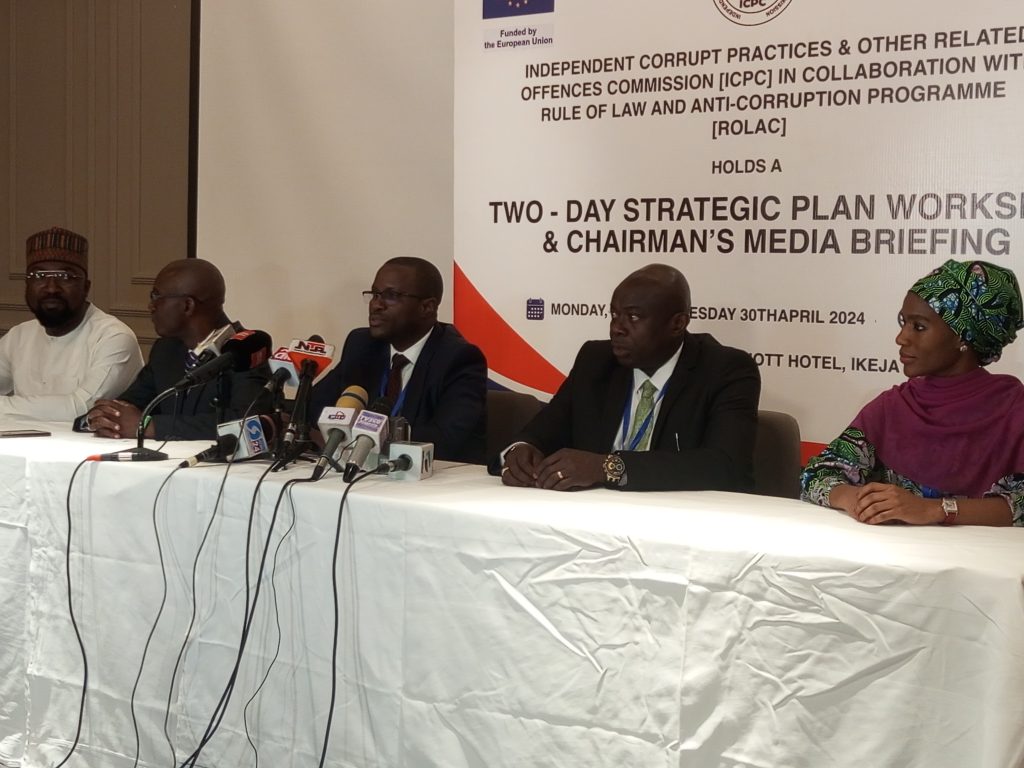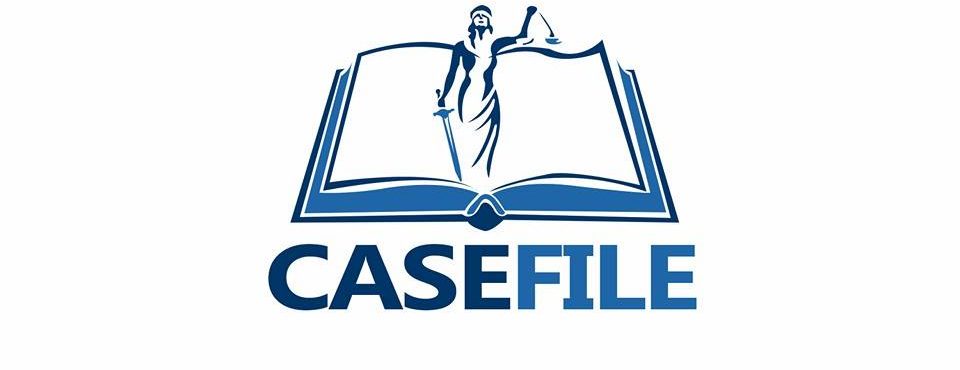Chairman of the Independent Corrupt Practices and Other Related Offences Commission, ICPC, Dr. Musa Adamu Aliyu, SAN, says it has tracked a total of N219,843,922,945.48 across 176 Ministries, Departments, and Agencies, MDAs.

The anti-corruption agency achieved the feat through the Constituency and Executive Project Tracking Initiative, CEPTI set up in 2019, to track funds released for constituency projects by public officials.
Dr. Aliyu saddled with affairs at ICPC since December 2023 disclosed this figure at a maiden press briefing in Lagos.
While reeling out the Commission’s achievements, Adamu noted that the initiative is to ensure government funds are directed towards impactful projects that benefit the most vulnerable Nigerians.
He stated that the 2024 Phase 6 exercise, which commenced in November 2023 and ran through the first quarter of 2024, covers the health, agriculture, education, water resources, and power sectors in 26 states and the FCT, and that the exercise is still ongoing.
According to him, “This tracking exercise focuses on critical sectors like education, agriculture, healthcare, and infrastructure, spanning 26 states and the FCT across all 6 Geo-political Zones.
He highlighted the findings from Phase 6 Tracking exercise, stating that a total of 1,721 government-funded projects were tracked within the Phase 6 tracking cycle, and that the commission is conducting further investigations on some infractions discovered.
Statement by the ICPC Chair
Find below the statement by the Chairman.
Media briefing by the Chairman, ICPC, Dr. Musa Adamu Aliyu, SAN held at Marriot Hotel, Ikeja GRA, Lagos on 29th April 2024.
Protocol:
1. I welcome you to this media briefing as we navigate the complexities of fighting corruption in our country. Transparency, clarity, and collaboration remain paramount to us at ICPC. Today’s briefing, therefore, serves as a platform to foster understanding, and collaboration between the Commission and the media to facilitate communication between us and the Nigerian people, and advance our collective efforts toward the progress and prosperity of our nation.
2. I’m delighted to be here in Lagos finalizing our strategic plan for the next four years. This event provides a valuable opportunity to engage with the media. This commitment to transparency reflects our core mission: the ICPC is not just an enforcement agency, but a “change agent” driving an open, ethical, and accountable Nigeria. We’ll achieve this through strong enforcement alongside collaboration with key partners. Let’s discuss our initial accomplishments, pressing challenges, and future plans to ensure a more prosperous Nigeria.
3. Since taking office in December 2023, I have prioritized strengthening anti-corruption prevention at the ICPC through strategic collaboration. This collaborative approach has yielded significant progress. This effort has led to the initiation, renewal, and establishment of numerous mutually beneficial partnerships with a broad range of stakeholders such as Code of Conduct Bureau, CCB, Economic and Financial Crimes Commission, (EFCC) and Nigerian Financial Intelligence Unit (NFIU). Other partners include government agencies, civil society organizations, professional associations, and bilateral bodies. Some notable examples include: Ministry of Communication, Innovation and Digital Economy, Federal Inland Revenue Service (FIRS) and Ministry of Interior among others.
4. The Commission is actively pursuing technological solutions to enhance transparency and accountability. Earlier this month, the ICPC met with the Minister of Communication, Innovation and Digital Economy to explore leveraging digital public infrastructure for anti-corruption efforts. This strategic collaboration aims to not only utilize technology to combat corruption but also to strengthen the ICPC’s overall capacity. From the foregoing, the ICPC’s commitment to partnering with institutions and agencies possessing technological expertise aligns perfectly with President Tinubu’s vision for a technology-driven fight against corruption.
5. The Commission’s anti-corruption strategy goes beyond collaboration. It also strengthens law enforcement (investigations, prosecutions) and tackles vulnerabilities in government systems. Public education and mobilization are key to our approach. This multi-pronged strategy aims for a more sustainable and legal fight against corruption in Nigeria.
Constituency And Executive Projects Tracking
6. Constituency and Executive Project Tracking Initiative (CEPTI) was conceived in April, 2019 by the ICPC as a preventive/intervention measure to tackle corruption and to, among others, engender good governance, transparency, and accountability within the body polity, focusing on how well monies allocated to critical sectors by the government are utilized.
7. The initiative was launched to track constituency project implementation and performance in 2015. A Steering Committee was set up to select projects for tracking in each of the Phases or tracking cycles. The Steering Committee comprises the Commission, Nigerian Institute of Quantity Surveyors, Budget Office of the Federation, Office of the Accountant General of the Federation, Office of the Auditor General of the Federation, Premium Times, International Centre for Investigative Reporting (ICIR), Bureau for Public Procurement and BudgIT.
8. The ICPC project tracking team combines investigators with technical experts. Quantity surveyors assess project quality, cost, and potential inflation. Civil Society Organizations (CSOs) monitor transparency and provide community feedback. Media coverage raises public awareness and fosters beneficiary participation, ensuring the initiative’s success. ICPC intend to involved and develop capacity of citizens where possible to take ownership of the projects assign to their various communities.
9. The Constituency and Executive Projects Tracking Group (CEPTG) is a powerful tool against corruption in government projects. This initiative tackles corruption at every stage, from investigating shady procurement to recovering stolen funds. They monitor project progress, ensure contractors deliver, and even analyze budgets to identify red flags. With successful recoveries and prosecutions under their belt, the CEPTG is working to ensure government projects translate into real benefits for Nigerians.
10. Having conducted a thorough investigation on some infractions identified on funded projects, the Commission has instituted cases against some suspects.
11. The Constituency and Executive Projects Tracking Group (CEPTG) has tracked a total of N219,843,922,945.48 across 176 Ministries, Departments, and Agencies (MDAs) since its inception in 2019. This tracking exercise focuses on critical sectors like education, agriculture, healthcare, and infrastructure, spanning 26 states and the FCT across all 6 Geo-political Zones. This initiative ensures government funds are directed towards impactful projects that benefit the most vulnerable Nigerians.
2024 Phase 6 Tracking Exercise
12. The Phase 6 exercise which commenced in November, 2023 through 1st quarter of 2024 covers the Health, Agriculture, Education, Water Resources, and Power sectors in 26 states and the FCT is still ongoing. Final report of the exercise will be published and be made public.
Highlight of Findings from Phase 6 Tracking Exercise
13. A total of 1,721 government-funded projects were tracked within the Phase 6 tracking cycle. The Commission is conducting further investigations on some infractions discovered. which are:
a. Under performed projects
b. Shoddily executed projects
c. Abandoned projects
d. Certification of Iprojects as complete of od when such projects have not been completed.
e. Hording of projects such as empowerment projects meant to be distributed to intended beneficiaries to empower them or serve to alleviate their poverty were hoarded, while some other items were distributed through proxies. It was observed that some agencies were in the habit of handing over empowerment items to stakeholders for onward distribution to the intended beneficiaries. This practice encouraged hoarding and politicization of the empowerment sharing processes.
14. To stem the tide of empowerment items being converted to personal use or for personal aggrandisement, and to engender value for money on government funds as well as for impactful socio-economic development of the citizenry, relevant MDAs have been mandated to invite ICPC to monitor the distribution of empowerment items on their budget.
Other findings are:
1.Projects in which contractors returned to sites
176
2.Appropriations for all tracked projects
N220 billion
3.Contracts value of all projects tracked
N285 billion
4.Value of projects on which contractors returned to sites
N30 billion
5.Cash Recoveries Made (so far)
N163 million
6.Recoveries Made In Assets(so far)
N513.3 million
7.Recoveries Made (so far)- Cash And Assets in 5 and 6 above
N676 million
8.Cumulative savings to government (+++)
N30 billion
9.Contractors/companies involved
1,355
The Head of the CEPTD will give details of interim report of the phase 6 tracking.
15. Achievements in the Maritime Sector
The ICPC, collaborating with other agencies, conducted a corruption risk assessment of key Nigerian seaports. This assessment identified vulnerabilities and led to the development of measures to improve transparency and accountability. These measures included:
• Standardized Operating Procedures (SOPs): Consistent procedures for all government agencies operating at the ports.
• Port Service Support Portal (PSSP): A web-based platform for addressing business complaints and grievances.
• Nigerian Port Process Manual (NPPM): A step-by-step guide to port operations promoting compliance and transparency.
An enforcement team (Ports Standing Task Team – PSTT) was established to ensure adherence to these measures. Their efforts resulted in:
• 50 arrests in 2023 related to 19 investigations.
• Legal proceedings initiated, including asset forfeiture.
• Improved port efficiency and streamlined operations, especially at Apapa and Tin-Can ports.
• Dismantling of corruption networks causing traffic congestion.
16. The Commission has over the years developed its capacity, experience, ideas and strategies to combat corrupt practices in public sector. We will continue on this trajectory under my leadership. However, the Commission requires support of all Nigerians which include the media to effectively deliver on its mandates.
17. Finally, we want to assure Nigerians that ICPC in discharge of its enforcement mandate is committed to adherence to the rule of law and international best practices in the investigation and prosecution of persons suspected to have committed corrupt practices.
Thank you so much for your attention.


